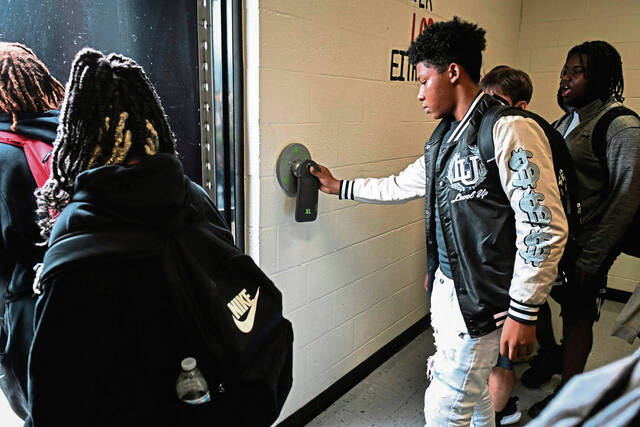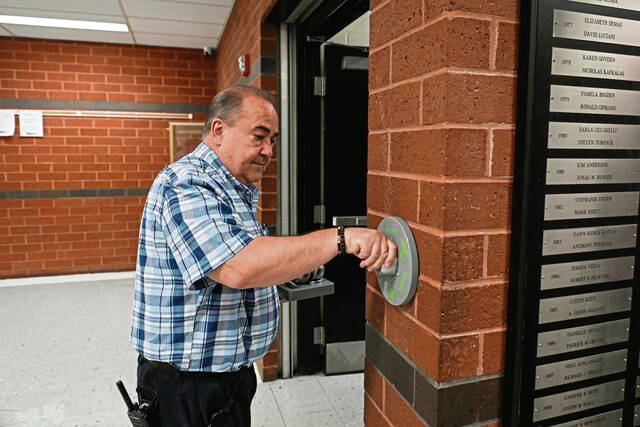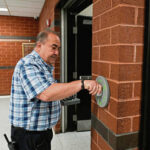When Plum Senior High School announced in August it would require students to turn in their cellphones at the start of each class, Dhruv Thakkar could not have been more opposed to the change.
“Me and my friends immediately jumped to the fact that our senior year was going to be completely ruined,” said Thakkar, 16, who considered expressing his concern to district administration.
The policy requires students to place their phones in a docking station at the start of each class period. Students retrieve their devices at the end of class, and they are permitted to use them during lunch and study hall.
“The first text message I sent my friends was like, ‘This is going to be the worst senior year that anyone in Plum has ever had,’ ” Thakkar said.
Nearly two months into the school year, Thakkar has changed his mind.
“As the school year started, a lot of that excitement kind of died down,” he said, “and students became more like, ‘OK, this isn’t the worst thing we’ve had to do.’ ”
Schools across the country — including some in Western Pennsylvania — have limited students’ access to cellphones in recent years as government officials have increasingly advocated for restrictions.
Among K-12 schools, 95% of students have cellphones and more than 80% have smartphones specifically, Pew Research Center reported in January.
Before Plum’s policy change, students who were caught using their phones in class were given a verbal warning, Thakkar said. Repeat offenses resulted in phones being taken away for the class period or stored in the front office until the end of the school day.
Cellphone violations were less common in advanced classes, Thakkar said.
“What I’ve noticed is that in the AP classes, students were more obedient,” he said. “If a student was asked to put their phone away, they would often listen. But in the standard classes or honors classes, students would often continue to use their phone — just in secret.”
Regardless, Thakkar admits a change needed to be made.
“Last year, whenever we did have our phones, I’d often feel an urge to text my friends in the middle of a class if it was really boring or scroll on Twitter,” he said. “But right now with the phones (in the docking station), I don’t even think about being on my phone. I’m just fully locked into class or doing the assignment we have to do.”
Environments improve
Plum is not the only district seeing benefits from tightening cellphone policies for students.
Monessen City School District spent $13,000 on Yondr pouches — locked bags meant to hold cellphones — and started using them at the middle and high schools at the end of last academic year, Superintendent Robert Motte said.
For middle school world cultures teacher Patrick Hull, the pouches have made all the difference.
“We had a cellphone policy, but it was tough to manage,” said Hull, who has taught in the district for more than 25 years. “It’s just the students have been so acclimated, especially since covid. For lack of a better word, they were addicted to their phones.”
Hull has noticed students take fewer bathroom breaks, arrive to class on time more often, pay closer attention and engage more deeply with classmates on assignments and discussions.
“I believe that academic performance will uptick because of this,” he said.
Policy ‘creates an expectation’
Some teachers, such as music teacher John DeLuce at Plum, have used the docking station method for years.
“Students would have their phones out a lot,” said DeLuce, who has taught in the district for 26 years. “It’s just one more thing to take the focus away, one more temptation, and it’s hard to differentiate if a student was looking up something educational, just checking their grades or if they were sending a text.”
Requiring this policy in all classrooms has produced a positive impact, he said.
“It’s a uniform approach,” he said. “It creates an expectation, a balanced expectation, that is very consistent for students from class to class.”
Students have adapted well to the policy, DeLuce said. He has not had to address any cellphone issues in class this school year.
“It seems to be working,” he said.
A student representative for Plum’s school board, Thakkar gave a report to the district last week highlighting the policy’s efficacy.
Teachers and administrators noted an increase in academic performance and fewer students roaming the halls, Thakkar said.
“A lot of the time, even in my AP classes, students would go to the bathroom for 15 to 20 minutes,” he said, “and you know that they’re either making a TikTok or scrolling on Instagram or something like that.
“But now since students aren’t allowed to take their phones to the restroom, students either don’t go to the restroom at all or go faster, leading to a more positive learning environment.”
A necessary ‘annoyance’
The restriction of cellphones from classrooms has come with drawbacks.
Monessen senior Jarrod Madison said he used to listen to music to help him focus while working individually on assignments in class. This option is no longer available as his phone sits locked away.
“I just find my mind wandering, and I can’t really focus on what’s in front of me,” he said.
Students at Jeannette Junior-Senior High School also have expressed frustrations with cellphone restrictions, Principal Vanessa White said.
The district’s high school students are asked to keep their phones out of sight during class time, unless permitted by a teacher, she said. Students in grades seven and eight must give their phones to their teachers at the start of each class.
“Students are not a fan of not having their phones, but for the most part they are receptive when an adult asks them to put it away.”
Parents, however, have had the opposite reaction, White said.
“Parents are pretty supportive and have commented on how students are distracted by phones at home and at school,” she said. “They have also stated that students (rely) on them way too much.”
Madison knows access to phones presented a distraction for students.
“There were issues with people recording people without their consent and people just not paying attention in class,” said Madison, 18. “A lot of my friends had the same reaction to me where it’s not an issue, but it’s more of an annoyance than anything.”
Decrease in bullying, fights
About a month into the school year, Hull has seen fewer incidents of bullying and aggression among students.
“It’s so much easier to say something negative to someone over a device,” he said.
There have been no physical fights or violent encounters between students this school year, Motte confirmed.
The policy change initially drew concerns and complaints from students and parents alike, Hull said.
“When we first gave the presentation (on the policy), students and some of their parents were saying they were transferring because the district was getting too strict,” he said. “But none of them did.”
Some students have even told Hull they are better off without access to their phone during the school day.
“We’ve been pleased with the compliance of the students,” Hull said. “I just think overall the learning environment and social environment has improved.”













